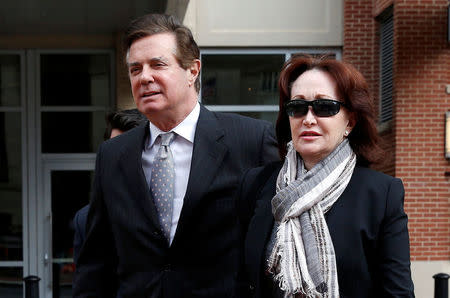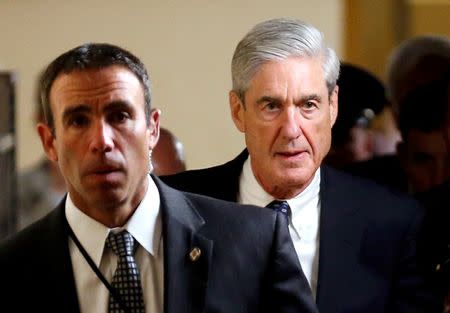Ex-Trump campaign chairman challenges special counsel's authority
By Sarah N. Lynch
WASHINGTON (Reuters) - President Donald Trump's former campaign chairman Paul Manafort will try to convince a federal judge on Wednesday to throw out criminal charges filed against him by Special Counsel Robert Mueller, arguing Mueller has overstepped his legal authority.
Manafort filed a civil lawsuit on Jan. 3 against Mueller and Deputy Attorney General Rod Rosenstein, the Justice Department official who appointed him, in a key legal test of how far the special counsel's mandate extends. Mueller is investigating potential collusion between Trump's campaign and Russia as well as whether the president has unlawfully tried to obstruct the probe.
Wednesday's hearing will mark the first time Manafort's lawyer will get a chance to persuade U.S. District Court Judge Amy Berman Jackson that Mueller's investigation has run amok and needs to be reined in.
Manafort is one of a number of people already charged in Mueller's probe, which has hung over Trump's presidency.
On Tuesday, Alex van der Zwaan, a Dutch lawyer who previously worked closely with Manafort and former Trump deputy campaign chairman Rick Gates, was sentenced to 30 days in prison for lying to Muller's investigators.
Manafort, who performed lobbying work for a pro-Russian former Ukrainian president before serving as Trump's campaign chairman in the 2016 U.S. election, is facing an array of charges in two indictments brought by Mueller in federal courts in Washington and Alexandria, Virginia. He is charged with offenses including conspiring to launder money, failing to register as a foreign agent, bank fraud and filing false tax returns.
Manafort has pleaded not guilty.
As a general matter, defendants like Manafort in criminal cases are not usually able to use civil litigation to try to challenge criminal charges. Justice Department lawyers are expected to bring up this point on Wednesday, saying the proper way to tackle alleged defects in the indictment is by raising them in the criminal case directly.
Rosenstein appointed Mueller in May 2017 and oversees the investigation. Manafort's lawsuit relies on an arcane law called the Administrative Procedure Act, which spells out the process federal agencies must follow when writing regulations. Mueller was appointed by Rosenstein under Justice Department rules governing the hiring of special prosecutors.
Manafort's lawyer is expected to argue that Rosenstein's order hiring Mueller is overly broad and not permitted by law because it gives the special counsel carte blanche to probe "any matters that arose or may arise" from his investigation into Russian involvement in the 2016 election.
He will also argue that Mueller's case against Manafort did not arise from his Russia probe, because the FBI investigated Manafort over the same conduct and closed the case in 2014. None of the charges against Manafort are directly connected to the 2016 election campaign.
The government will tell the judge that Manafort has no right to challenge how the Justice Department's rules governing special prosecutors are enforced.
A court filing on Monday showed Mueller is specifically authorized to investigate whether Manafort colluded with Russia to interfere with the 2016 presidential election and his ties to Ukraine's former pro-Russia government prior to 2016.
Manafort's lawyer Kevin Downing is seeking to have the charges dismissed in both criminal cases using similar arguments. In the Washington criminal case, the same judge is also presiding over the civil litigation.
(Reporting by Sarah N. Lynch; Editing by Will Dunham)



